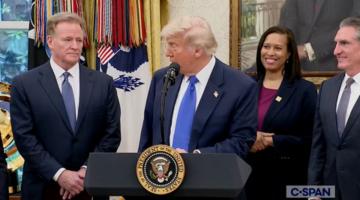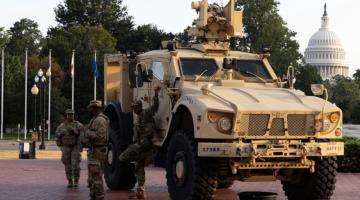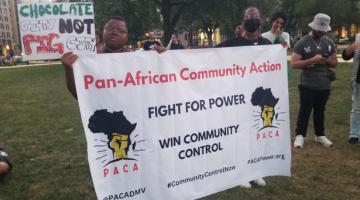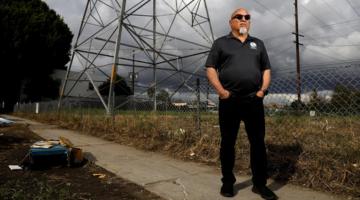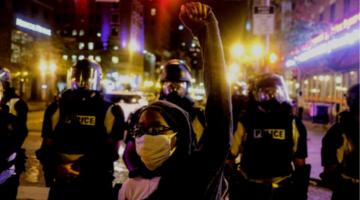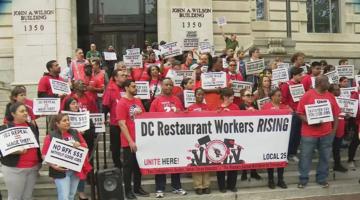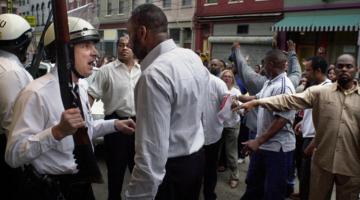The rhetoric of crime prevention has always served to enforce colonial order. Today, this same logic drives the policing of Black neighborhoods as a form of urban pacification.
Originally published in Hood Communist .
The concept of “crime” is not a fixed, objective reality but a fluid and politically potent construct which has been meticulously weaponized to serve the interests of power. Crime is in fact a dialectical product of the very systems of domination it purportedly challenges. An elusive chameleon, the shifting definitions of crime justify the expansion of state control, the suppression of dissent, and the advancement of imperial projects, both domestically and globally. Whether “high crime” or “low crime” , the rhetoric is rarely about public safety; rather, it is the primary language through which state agencies validate their own existence, and the imperialist state escalates its violence, masking the carceral and militaristic enforcement of social order to maintain hegemony under the guise of moral necessity. This manipulation reveals a continuum of control, where the domestic police state and global imperialism are not separate entities but interconnected systems using the same logic of criminalization to manage populations and resources.
Within the United States, the discourse on crime functions as the engine of domestic imperialism, particularly over the African/Black internal colony. The bipartisan commitment to “tough-on-crime” policies has systematically normalized the criminalization of poverty and Blackness, creating a populace conditioned to accept ever-more repressive measures. The tragedy is not just a figure like Donald Trump’s brazenness, but the Democratic Party’s decades-long failure to dismantle the very systems that enable it.
This foundation is starkly visible in the paradox of Baltimore. Under Mayor Brandon Scott’s “low crime” tour, the city is presented as a success story of managed violence . Yet, this “success” is predicated on the validation of a working police state: a city occupied via the Department of Defense’s 1033 program, which militarizes local police with surplus military hardware; enmeshed in “deadly exchange” programs where US police train with Israeli occupation forces, exchanging tactics of occupation; targeted by federal initiatives like Operation Relentless Pursuit; and subjected to proposals for a “Cop City” and a billion-dollar jail. As Scott pronounces Baltimore as the latest Wakanda safe haven, Baltimore City Police murdered Bilal “BJ” Abdullah, Pytorcatcha Clarke-Brooks, and Dontae Milton in just 2 weeks. These murders, however, are not part of the “low crime” discussion. Here, “low crime” is not an indicator of safety or well-being as purported, but a metric of efficient pacification of people, demonstrating how a population can be governed through preemptive criminalization and militarized containment.
In direct contrast, Donald Trump’s declaration of “high crime” in Washington, D.C. served as the validation for a different, though related, state objective: the overt militarization of an alleged failed police state. His announcement to deploy the National Guard , framed as a necessary crackdown, marked a dangerous escalation in the federal government’s militarization of the nation’s capital. This move, following the Democrat-backed “Secure DC” Omnibus bill , exposes the seamless continuum of carceral logic. Where the “low crime” narrative justifies a perpetual, normalized occupation, the “high crime” narrative justifies a sudden, overt infusion of military force, effectively blurring the lines between policing and soldiering—a process of policification of the military, as noted by scholar Dr. Charisse Burden-Stelley. This same framework was deployed months earlier in L.A. to justify aggressive immigration policies, where the foundational narrative of “criminals” pouring across the border legitimized the mass deployment of National Guard troops and provided a pretext for aggressive deportation campaigns. With the subjective use of criminalization to wield repressive policy and action, it becomes increasingly clear how the oppression of immigrants is very relevant for Black communities.
This domestic playbook is exported directly to foreign policy, where “crime” becomes the pretext for neocolonial aggression and the denial of sovereignty and self-determination. The United States’ bounty on Venezuelan President Nicolás Maduro, signalling alleged “criminal drug cartel activity,” is a quintessential example of criminalization as an act of economic and political warfare. This narrative was eagerly adopted by Trinidad and Tobago’s returned Prime Minister, Kamla Persad-Bissessar, who has aligned herself with far-right ideologies mirroring Trump’s rhetoric. By constantly alluding to her nation’s “high crime” as a direct result of Venezuela, she acts as a neocolonial lapdog, endangering Caribbean solidarity and providing a humanitarian veil for alignment with U.S. military aggression. This cynical blame-shifting obscures a vicious cycle: the United States, through its lax firearm regulations, actively enables the cross-border proliferation of weapons that fuel the very violence destabilizing Caribbean nations. Having exported the tools of violence, the U.S. then offers itself as the necessary military “solution,” a strategy that distracts from its own culpability and strengthens its imperial grip under the pretext of solving a problem it engineered. The crisis in the Caribbean is not fundamentally rooted in violence and crime but in the enduring legacies of imperialism and neoliberalism, which perpetuate systemic inequality, poverty, and underdevelopment.
Nowhere is this dynamic more blatant than in the UN/US-led Kenyan occupation of Haiti . The denial of Haitian sovereignty stands as a testament to a global elite consensus that undermines popular democracy. The deployment of foreign forces, under the guise of combating criminal gangs, is the international manifestation of the “high crime” justification, used to nullify a nation’s right to self-determination. This systematic suppression is a live execution of strategies akin to those in the U.S.’s Global Fragility Act (GFA) . The GFA, under the pretext of “preventing conflicts” and “promoting stability,” rebrands US imperialism by leveraging neocolonial governments and local structures to enact policies aimed solely at upholding U.S. global power. Domestically, this looks like aggressive policing that leads to over-policing and racial profiling rather than safety (ie. War Against Crime ). Internationally, it looks like Kenya policing Haiti. The recently formed “Alliance for Security, Justice, and Development Strategy ” for Latin America and the Caribbean (LAC) confirms this model. While framed as regional, it is led by US, Interpol, and Europol, prioritizing foreign security interests over local sovereignty and development, effectively creating an international carceral network.
Ultimately, “crime” is the key rhetorical device in the vast project of control over civil society. It is a fallacy because its definition is never neutral; it is engineered by the state to serve the state. It is weaponized because it provides the moral and political capital to expand budgets, deploy troops, build jails, overthrow governments, and occupy nations—all while presenting the aggressor as the guardian of order. If, as theorized, crime is not mere individual deviance but a phenomenon conditioned by the same structures that produce domination, then the modern imperialist state’s power to define criminality becomes its ultimate neocolonial instrument, crafting legal legitimacy for its own material interests.
Furthermore, the Western imperialist framing of “crime” as the arbitrary act of an individual against the social order is exposed as a profound hypocrisy by its enthusiastic support for state-sanctioned violence. This double standard is glaringly evident in the stance of the US and its partners, including CARICOM states that hyperfixate on localized crime, yet all offer little to no criticism of Israel’s genocidal acts and annexation of Gaza , instead continue to support it under the guise of a “right to defend itself,” actively enabling a project of collective punishment in Gaza that meets the legal definitions of war crimes and famine. As children die of starvation (their deaths meticulously tallied by a besieged Health Ministry) the U.S. government withholds the means of survival but rolls out the red carpet for the architect of this catastrophe, Prime Minister Netanyahu, treating an internationally recognized war criminal as an honored statesman. This reveals a brutal calculus: their condemnation of “crime” is a malleable ideology, a tool designed to criminalize the resistance of the oppressed while legitimizing the systemic, industrial-scale violence of the oppressor, proving that the “rule-based international order” is merely the rule of the dominant.
Ultimately, the path to liberation necessitates a fundamental shift in understanding the very concept of “crime” as a political construct engineered to subdue resistance and legitimize state violence. This deconstruction is not an end but a prerequisite, clearing the ideological ground to expose how the language of criminality has been a primary weapon of imperialism and white supremacy. This is not merely a theoretical exercise, but in the battle of ideas in the war waged against the colonized and the poor, it is an essential foundation for how we organize to fight for peoples-centered human rights, collective self-determination, and the material needs of people over the predatory demands of the state and capital.
Erica Caines is a writer and organizer in Baltimore and the DMV. Caines is the Field Operations and Membership coordinator of The Black Alliance For Peace, a member of the Black working-class centered Ujima People’s Progress Party in Maryland, and founder of #LiberationThroughReading, providing African children with books that represent them.


